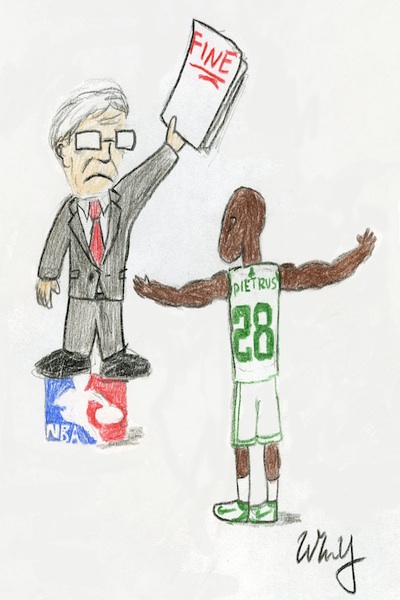
At the rate professional athletes are being fined these days, it’s a good thing they make a lot of money. Some of it is understandable; the NFL wants to protect players, for instance, and penalizes defenders for helmet-to-helmet hits. On the other end of the spectrum, however, are some truly bizarre fines, such as the MLB docking Giants’ closer Brian Wilson $1,000 dollars in 2010 for wearing cleats with too much orange on them.
The reason I bring this up is that the NBA instituted a new set of rules for the 2012-2013 season to discourage flopping, and I think it’s a great idea. Flopping, or diving, is now defined by the NBA as “any physical act that appears to have been intended to cause the referees to call a foul on another player.”
Essentially, a flop occurs when a player falls (or flops) following minimal contact in an attempt to trick the referees. Players will be warned following their first offense, but each subsequent flop will carry with it a bill from commissioner David Stern’s office ranging from $5,000 to $30,000 and up, depending on the number of times the player has been caught before.
Of course, it is often impossible for referees on the floor to determine immediately whether a player flopped or was legitimately fouled. Thus, the penalties will be assessed based on postgame video reviews. This approach seems best, because while many flops might go unnoticed in the heat of the moment, they become blatantly obvious on video, which should make players think twice before taking a dive.
The first fine was recently handed out to Reggie Evans of the Nets, who flopped against the Lakers on Nov. 20. The league acted swiftly, ruling within a day that Evans, who had already been warned, would be fined $5,000.
Some people have been quick to classify the rule on the Brian Wilson end of the spectrum of ridiculous fines, including the National Basketball Player’s Association, which is filing a grievance with the league and the U.S. National Labor Relations Board. The Player’s Association maintains that the NBA needs to consult the union before imposing new economic penalties on the players under the terms of the current collective bargaining agreement, while the NBA believes that its actions are well within its right.
But that is beside the point.
I happen to disagree with the Player’s Association, and believe that the new anti-flopping rule is good for the NBA. The fines seem very reasonable to me as well. Flopping became quite visible last year, especially in the playoffs, much to the chagrin of ESPN broadcaster Jeff Van Gundy. During Game 5 of the Eastern Conference Finals, for instance, Boston’s Mickael Pietrus took a dive with just under three minutes to play to draw a crucial technical foul and help his team ice the game.
Van Gundy, one of the commentators, remarked that Pietrus ought to be “fined $1 million tomorrow for it.” Naturally, Van Gundy was being sarcastic, but his sentiment rang true. Flops like Pietrus’s are no different than cheating, and have no place in any sport, let alone at the highest levels. As referees have proven time and time again, even professionals are far from perfect, and vulnerable to being fooled and tricked.
The NBA does not currently have a serious flopping problem, but given a few more years, it could easily develop one. Unfortunately, the behavior is already visible to almost any casual observer who watches at least a handful of NBA games every year. For that reason, this seems like the perfect time for the league to embrace an anti-flopping rule and nip the troubling behavior in the bud.
While some people might argue that the practice is not common enough to merit this new system of fines, it seems prudent on the league’s part to try to deal with the problem before it becomes ingrained as part of the game. The last thing the NBA should want is to turn into soccer, where untouched players can be seen diving to the turf and complaining to the referee constantly.
In addition, several NBA stars have spoken out in support of the new rules, including Kobe Bryant and James Harden, which may help it gain traction among the rest of the league. As a player, flopping would annoy me to no end if it worked to sway the referees, because it brings the sport down to the level of professional wrestling. As the NFL’s experiment with replacement referees this year revealed, fans and players need to have confidence that the referees can do their jobs, or things will get out of hand. Successful flops are the first step down that undesirable path. In a perfect world, the rule will serve to discourage flopping from players and fines will rarely need to be assessed. This hope may be a bit idealistic on my part, but I sincerely hope the new rule works. After all, fans who want to watch acting can turn on a movie. Or a soccer game.



